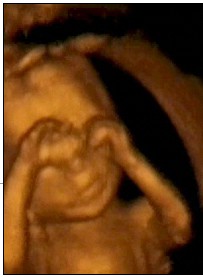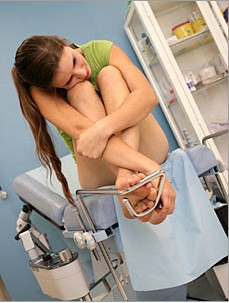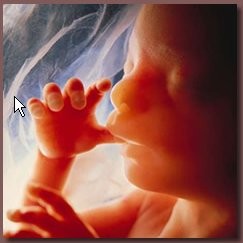Doctors against abortions in surgeries
 scan of 24-week-old bay in the womb scan of 24-week-old bay in the womb
photo: Evening Express
 A recent poll of GPs show that a third of GPs are unwilling to implement Government proposals which would see women having abortions in local surgeries. A recent poll of GPs show that a third of GPs are unwilling to implement Government proposals which would see women having abortions in local surgeries.
Under current Government plans, women will be able to have abortions at their local GP surgery.
The scheme would involve medical terminations, carried out by a nurse under the supervision of a doctor. Medical abortions are performed with a powerful drug, which triggers a miscarriage. They can be carried out in the first nine weeks of pregnancy.
The trust is acting after a pilot study by the Department of Health last May found that the so-called “abortion pill”, Mifepristone and Misoprostol, could be used safely in community-based settings.
And now the NHS in the London borough of Islington wants to pioneer early terminations at GP surgeries and health centres.
But new figures now show that a third of GPs would refuse to work in a surgery that offers abortions, new figures show. A poll of 480 doctors by GP newspaper found that 33 per cent would not work where abortions were carried out.
There are now almost 200,000 abortions carried out every year in the UK and the number is continuing to rise.
In 2006 figures for the number of abortions carried out in Scotland showed that 12,603 pregnancies were terminated in 2005, the highest level since abortion was made legal in 1967.
Yearly figures for England and Wales showed the number of abortions among girls under 14 rose 21%, from 135 abortions in 2006 to 163 in 2007.
There was also an 11% rise among girls aged 14, from 907 abortions in 2006 to 1,008 in 2007. Furthermore, there were 3,205 abortions to girls aged 15 in 2007, a 9% increase on the 2,948 in 2006.
Among all girls aged under 16, there was a 10% rise, from 3,990 abortions in 2006 to 4,376 in 2007.
Yet Ann Furendi of the British Pregnancy Advisory Service has said: "A rise in the number of abortions is not the problem in itself - the real problem is the number of women experiencing unintended pregnancy.
 When Caroline Flint was Health Minister she said: "We welcome the fact that a higher percentage of abortions are taking place at an early stage - almost two-thirds under 10 weeks gestation and most under 13 weeks. When Caroline Flint was Health Minister she said: "We welcome the fact that a higher percentage of abortions are taking place at an early stage - almost two-thirds under 10 weeks gestation and most under 13 weeks.
Meanwhile current Health minister Dawn Primarolo, said: "Our priority is to reduce the time women have to wait for an abortion at what is already a very difficult time for them. These statistics show that we have made considerable progress in this, with over two-thirds of women having their abortion at under 10 weeks in 2007, up from half in 2002."
Doctors are bound to the Hippocratic Oath which is traditionally taken by physicians and pertains to the ethical practice of medicine. Part of the oath states:
"I will not give a lethal drug to anyone if I am asked, nor will I advise such a plan; and similarly I will not give a woman a pessary to cause an abortion. [Emphasis added] But I will preserve the purity of my life and my arts."
27 October 2007 marked the 40th anniversary of Parliament passing the Abortion Act, which legalised abortion. The law came into force on 27 April 1968.
In 1966, when Parliament was debating the Bill, David Steel (then an MP and an architect of the abortion law) said: "[It is] not the intention of the promoters of the Bill to leave a wide open door for abortion on request."
|